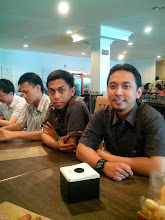Tugas Bhs. Inggris 5, 6, 7, & 8
Adjective Clauses is also RELATIVE CLAUSE which
Clause (the sentence) used/function as adjective that explains the State of the
noun or pronoun. And At a
certain point in your writing in English, you should be able to identify every
sentence you write as simple, compound, or complex. Two additional
structures, adjective clauses and appositives, will give you a much greater
sentence variety within which to accomplish your writing objectives. This
page contains a small amount of information about adjective clauses along with
just ten very difficult exercises. First, we will define what adjective clauses
are and how they work. An adjective clause is a dependent clause that
modifies a noun.
The adjective clause will follow one of these two patterns:
 |
| http://www.chompchomp.com |
Adjectively clause can be classified into two types :
- personal pronoun (the connector used is : who , whom , whose , that. )
- the object of an animal (the connector used is : Which, That).
- Time ( the connector used is : When).
- Place (the connector used is : Where).
- Reason (the connector used is : When).
Example of Adjective Clause:
- The boy whose radio was stolen is a student.
- The reason (that) I came should be obvious to you.
- The time when the plane takes off and lands will be changed soon.
- He who can no longer pause to wonder and stand rapt in awe is as good as dead.
- The means by which we live have outdistanced the ends for which we live. Our scientific power has outrun our spiritual power. We have guided missiles and misguided men.
- The man that invented the cuckoo clock is no more.
Example a part of article containing the adjective clauses (underline) :
The study found that the pump,
known as a VAD, for ventricular assist device, is superior to the most potent
drugs for heart failure and may eventually prevent the deaths of up to 100,000
Americans each year, the study's authors told a meeting of the American Heart
Association. The findings may change the treatment of heart failure, a major
cause of death in the United States, said Dr. Eric A. Rose, the main
investigator in the study and chairman of the department of surgery at Columbia
University College of Physicians and Surgeons in Manhattan. The term heart
failure refers to a specific condition in which
the heart muscle becomes weak and cannot pump effectively. It is often caused
by coronary artery disease, heart attacks or high blood pressure. Nearly five
million Americans live with
varying degrees of heart failure, and more than a half-million develop the
condition each year. Half of those who receive the diagnosis die within five
years, despite advances in drug therapy. Assist pumps were first developed as a
temporary measure to keep people with advanced heart failure or other severe
cardiac problems alive while
they waited for heart transplants. But when many patients, unable to get
transplants, lived with the pumps for long periods some for four years doctors
began looking to the device as a permanent therapy. Long-term use was proved
feasible in the study, which was the first to compare the pumps and the latest
drugs for patients with the
most severe heart failure, Dr. Rose said. The risk of death in the study was 48
percent lower among patients who received the device than among those receiving
the most potent cardiac drugs.
Nevertheless, Dr. Rose said
that the device was not a cure for heart failure and that it involved a
complication rate 2.35 times higher than that
for drugs in the study. The complications included serious infections, bleeding
and mechanical malfunctions like motor failure, kinking of the tubes and worn
bearings. Dr. Rose said that the rate of complications was expected to fall
with modifications to the device. Heart failure is the only form of heart
disease that is increasing in this country. The reason is that hundreds of thousands of patients who have survived heart attacks or had coronary bypass
operations go on to develop heart failure as their heart disease progresses. Assist
pumps may eliminate the need for some transplants, and so may help alleviate
the serious shortage of donor hearts for transplant. Permanent assist pumps
would also eliminate the risks of the immune- suppressing drugs that transplant
recipients need to prevent rejection of the donated heart. Fewer than 2,200
heart transplants were performed in this country in 1999. More than 4,000
patients were on the waiting list, and many died before an organ became
available. Many more have died before they could even get on the list. Dr. Rose
said that if the Food and Drug Administration approved assist pumps for
permanent use, he expected treatment of end-stage heart failure eventually to
resemble that of end-stage kidney failure. "It is premature to say that
VADS are as good a treatment now as dialysis," he said, "but you
could envision that over time" they would become so.
Questions and Answers of the excercises :
1.
I talked to the woman she was sitting next to me
I talked to the woman who was sitting next to me
2.
I have a class it begins at 08.00 Am
I have a class which begins at 08.00 Am
3.
The man called the police his car was stolen
The man whose car was stolen called the police
4.
The building is very old he lives there
The building where he lives is very old
5.
The woman was ms Silvy I saw her
The woman whom I saw was ms Silvy
Reference :
-
- The second reference here
-
The third reference here
- The fourth reference here










 5:35 PM
5:35 PM
 Blog-Online
Blog-Online

 Posted in:
Posted in: 



